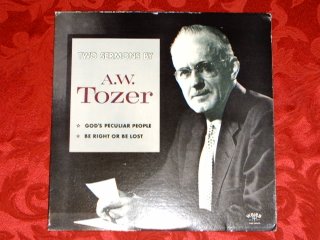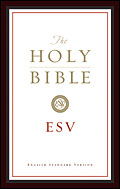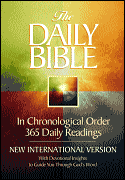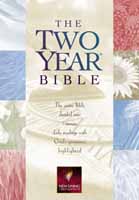A Surprise Christmas Present from the Basement of Southern Seminary

Last evening as I was doing laundry in the laundry room located in the basement of Southern Seminary's Fuller Apartments, where I live, I passed by a table marked, 'Free: Take What You Like.' This is a fairly common occurance, as people are always moving in and out of the different apartments on campus and thus trying to rid themselves of excess possessions they have accumulated in order to make the move easier. Usually the items on these 'free' tables are items unwanted by either the people moving or any of their friends. Among the odds and ends I searched through on this particular table, I found a small stack of record albums. (For those of you who don't know, record albums are kinda like CDs, only a lot bigger. :)) In this stack of records, I found the album pictured above. This disc, with a sermon from A.W. Tozer on each side, was a rare find and I'm thankful for whoever left it for me to take.
A few words about Tozer: I believe I was first introduced to A.W. Tozer in Pastor John MacArthur's excellent book, Ashamed of the Gospel. Interested in Tozer from the quotes I had read in MacArthur's book, I read Tozer's most famous books, The Pursuit of God and Knowledge of the Holy, which books I had borrowed from my friend Elizabeth Bookout. I would highly recommend either of these books, which would both be on the list of my top 10 favorite books of all time.
In addition to being an author, Tozer was also pastor of Southside Alliance Church in Chicago. Though Tozer went to be with the Lord in 1963, his sermons can still be heard on SermonAudio.com.
Following are a few highlights from the teaching of A.W. Tozer:
Tozer on Theology:
In the first sentence of Knowledge of the Holy, chapter one, Tozer wrote, “What comes into our minds when we think about God is the most important thing about us.” He asserted that what we believe about God- not just the confessions we point to, but our private thoughts about God, will always shape our character. This is one reason it is so important to carefully conform our thoughts about God to what He has revealed in His Word.
Tozer on the Incomprehensibility of God:
Though Tozer exhorted his readers and listeners to attain sound biblical knowledge of God, he realized that God can never be fully known by His creatures. In Knowledge of the Holy, Tozer also wrote, “It is obviously impossible for a limited mind to grasp the Unlimited.” That God is in a sense unknowable is clear from the first words of Scripture- “Even the most vigorous and daring mind is unable to create something out of nothing by a spontaneous act of imagination.” Anything that we can even imagine is only based upon things God has already created. The yearning to know the unknowable arises from the image of God in the nature of Man, but we can only know God through Jesus Christ, and our knowledge of Christ is dependent on the hearing or reading of Scripture. The question “What is God like in Himself?” is unanswerable- the question “What has God disclosed about Himself that the reverent reason can comprehend?” is what we seek to know.
Tozer on the Trinity:
In Knowledge of the Holy, Tozer also had some helpful insights into the nature of the Trinity. Tozer asserted that the Trinity is certainly mysterious, but, on final analysis, so is everything else. An example of how everything is, in a certain very real sense, mysterious is drawn from the nature of electricity. We can describe what electricity does, but as to what it is, who can accurately say beyond mere symbols that do not form a concrete image in the mind? Secularists merely lie to themselves when they claim true understanding of even the most basic things in nature. We do not believe in the Trinity due to human reason, but, “Belief in the Trinity has since the days of the apostles shone above the Church of the Firstborn as she journeyed down through the years.” Tozer demonstrated how the Bible teaches the Trinity to work in unity: In creation (Gen.1:1; Col. 1:16; Job 26:13 and Ps. 104:30), in the incarnation (Luke 1:35), at baptism (Matt. 3:16-17), in the atonement (Heb. 9:14), in the resurrection (Acts 2:32; John 10:17-18, and Rom. 1:4), in our salvation (I Pet. 1:2), and in the indwelling of our souls (John 14:15-23).
Tozer on Pragmatism:
Tozer noticed that pragmatism had crept into the church of his day... He wrote, "I say without hesitation that a part, a very large part, of the activities carried on today in evangelical circles are not only influenced by pragmatism but almost completely controlled by it. Tozer described the danger posed to the church by even so-called "consecrated" pragmatism:
The pragmatic philosophy...asks no embarrassing questions about the wisdom of what we are doing or even the morality of it. It accepts our chosen ends as right and good and casts about for efficient means and ways to get them accomplished. When it discovers something that works it soon finds a text to justify it, "consecrates" it to the Lord and plunges ahead. Next a magazine article is written about it, then a book, and finally the inventor is granted an honorary degree. After that any question about the scripturalness of things or even the moral validity of them is completely swept away. You cannot argue with success. The method works; ergo, it must be good.[Tozer, God Tells the Man Who Cares (Harrisburg, Penn.: Christian Publications, 1970), 71. Found in MacArthur, Ashamed of the Gospel (Wheaton, Ill.: Crossway Books, 1993), 80-81.]
Tozer on Evangelism:
Perhaps the most important article ever written by Tozer was his essay, "The Old Cross and the New." From the memorable first words of this essay, "All unannounced and mostly undetected there has come in modern times a new cross into popular evangelical circles. It is like the old cross, but different: the likenesses are superficial; the differences, fundamental," Tozer rails against modern evangelical practices that ignore the Gospel call to repentance and undermine a vital aspect of the biblical significance of the cross. I strongly encourage anyone reading this blogpost to read "The Old Cross and the New" in its entirety and to pray that the LORD would bring a revival of true Gospel preaching to churches throughout the United States and the world.
















